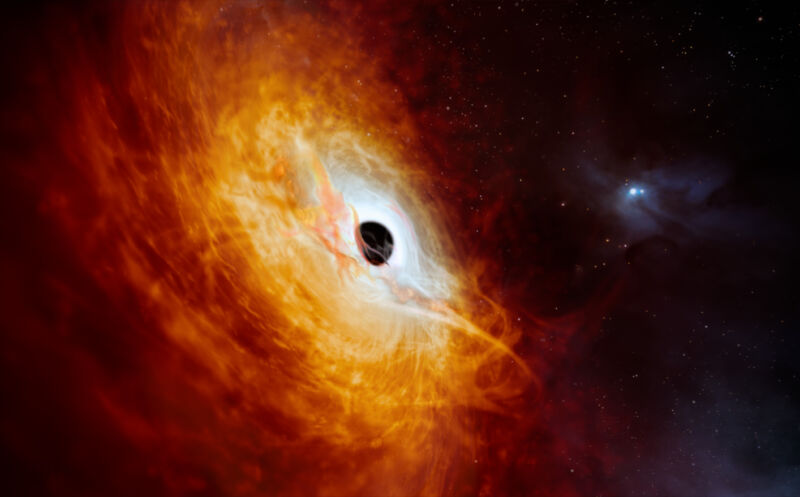Quasars initially confused astronomers when they were discovered. First identified as sources of radio-frequency radiation, later observations showed that the objects had optical counterparts that looked like stars. But the spectrum of these ostensible stars showed lots of emissions at wavelengths that didn't seem to correspond to any atoms we knew about.
Eventually, we figured out these were spectral lines of normal atoms but heavily redshifted by immense distances. This means that to appear like stars at these distances, these objects had to be brighter than an entire galaxy. Eventually, we discovered that quasars are the light produced by an actively feeding supermassive black hole at the center of a galaxy.
But finding new examples has remained difficult because, in most images, they continue to look just like stars—you still need to obtain a spectrum and figure out their distance to know you're looking at a quasar. Because of that, there might be some unusual quasars we've ignored because we didn't realize they were quasars. That's the case with an object named J0529−4351, which turned out to be the brightest quasar we've ever observed.
That’s no star!
J0529−4351 had been observed a number of times, but its nature wasn't recognized until a survey went hunting for quasars and recognized it was one. At the time of the 2023 paper that described the survey, the researchers behind it suggested that it had either been magnified through gravitational lensing, or it was the brightest quasar we've ever identified.
In this week's Nature Astronomy, they confirmed: It's not lensed, it really is that bright. Gravitational lensing tends to distort objects or create multiple images of them. But J0529−4351 is undistorted, and nothing nearby looks like it. And there's nothing in the foreground that has enough mass to create a lens.
So, how do you take an instance of an incredibly bright object and make it even brighter? The light from a quasar is produced by an accretion disk. While accretion disks can form around black holes with masses similar to stars, quasars require a supermassive black hole like the ones found at the center of galaxies. These disks are formed of material that has been captured by the gravity of the black hole and is in orbit before falling inward and crossing the event horizon. Light is created as the material is heated by collisions of its constituent particles and gives up gravitational energy as it falls inward.
Getting more light out of an accretion disk is pretty simple: You either put more material in it or make it bigger. But there's a limit to how much material you can cram into one. At some point, the accretion disk will produce so much radiation that it drives off any additional material that's falling inward, essentially choking off its own food supply. Called the Eddington limit, this sets ceilings on how bright an accretion disk can be and how quickly a black hole can grow.
Factors like the mass of the black hole and its spin help set the Eddington limit. Plus, the amount of material falling inward can drop below the Eddington limit, leading to a bit less light being produced. Trying various combinations of these factors and checking them against observational data, the researchers came up with several estimates for the properties of the supermassive black hole and its accretion disk.
Extremely bright
For the supermassive black hole's size, the researchers propose two possible estimates: one at 17 billion solar masses, and the other at 19 billion solar masses. That's not the most massive one known, but there are only about a dozen thought to be larger. (For comparison, the one at the center of the Milky Way is "only" about 4 million solar masses.) The data is best fit by a moderate spin, with us viewing it from about 45 degrees off the pole of the black hole. The accretion disk would be roughly seven light-years across. Meaning, if the system were centered on our Sun, several nearby stars would be within the disk.
The accretion rate needed to power the brightness is just below the Eddington limit and works out to roughly 370 solar masses of material per year. Or, about a Sun a day. At that rate, it would take about 30 million years to double in size.
But it's rare to have that much material around for one to feed that long. And a look through archival images shows that the brightness of J0529−4351 can vary by as much as 15 percent, so it's not likely to be pushing the Eddington limit the entire time.
Even so, it's difficult to understand how that much material can be driven into the center of a galaxy for any considerable length of time. The researchers suggest that the ALMA telescope array might be able to pick up anything unusual there. "If extreme quasars were caused by unusual host galaxy gas flows, ALMA should see this," they write. "If nothing unusual was found in the host gas, then this would sharpen the well-known puzzle of how to sustain high accretion rates for long enough to form such extreme supermassive black holes."
The whole accretion disk is also large enough that it should be possible to image it with the Very Large Telescope, which would allow us to track the disk's rotation and estimate the black hole's mass.
The system's extreme nature, then, may actually help us figure out its details despite its immense distance. Meanwhile, the researchers wonder whether other unusual systems might remain undiscovered simply because we haven't considered that an object might be a quasar instead of a star.
Nature Astronomy, 2024. DOI: 10.1038/s41550-024-02195-x (About DOIs).



3175x175(CURRENT).thumb.jpg.b05acc060982b36f5891ba728e6d953c.jpg)
Recommended Comments
There are no comments to display.
Join the conversation
You can post now and register later. If you have an account, sign in now to post with your account.
Note: Your post will require moderator approval before it will be visible.